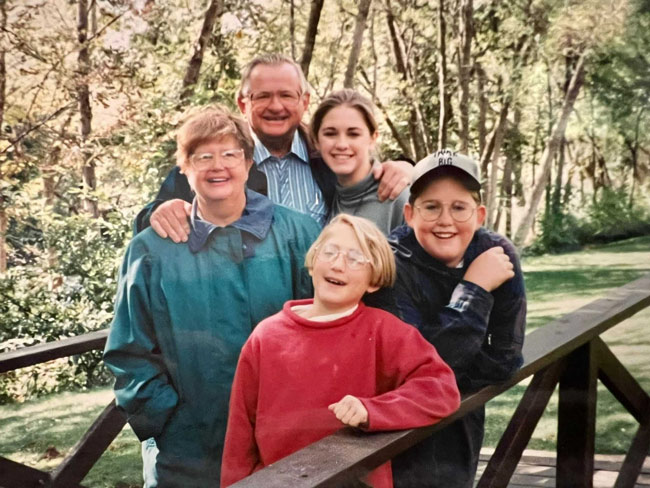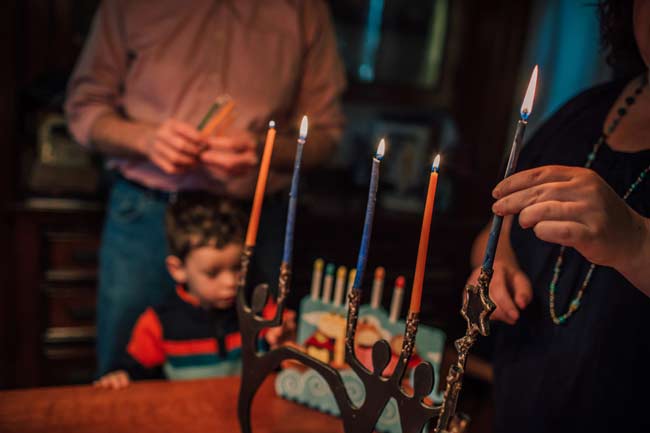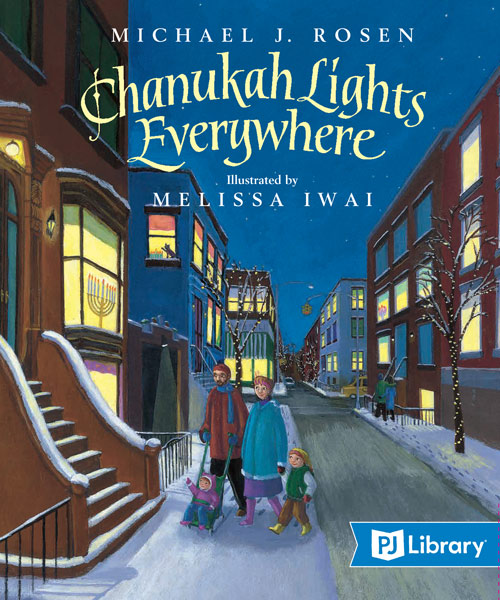 The author (back row, third from left) with her siblings and maternal grandparents, sharing winter holidays in Arizona.
The author (back row, third from left) with her siblings and maternal grandparents, sharing winter holidays in Arizona.
One of my favorite holiday memories from childhood is of dozing by the fire, watching my grandfather’s model train circle the living room and the lights on the Christmas tree, those giant, old-fashioned bulbs, glow brighter as it grew dark outside.
But Christmas wasn’t my holiday. I grew up in a fully Jewish home: that meant Jewish preschool, three-days-a-week religious school, youth groups, camps, regular synagogue attendance, Shabbat dinners, and even two sets of dishes. Our Hanukkah traditions were as vibrant as they were varied: a growing collection of menorahs, each one lit every night; jalapeño latkes, since we lived in the Southwest; my mother’s handmade decorations; bags of gelt taped to every wrapped gift; and donating to tzedakah one night instead of exchanging gifts. My mother, a Jew-by-choice, wove her commitment to Judaism into family life, and her non-Jewish parents—my grandparents—embraced it wholeheartedly. They hung a mezuzah on their door, learned the central brachot, traveled with us to Israel, and celebrated Jewish holidays at our home. In turn, we celebrated their holidays as an act of love for them.
My parents and grandparents found ways to honor each other’s traditions, uplifting one without compromising the other. My grandparents gave us gifts on Hanukkah, and we gave them gifts on Christmas. We didn’t celebrate Easter, but we brought them a basket of their favorite treats. They served turkey at Christmas, avoiding treif (unkosher foods) so that we could eat dinner with them. As my grandfather approached the end of his life he made the extraordinary choice to ask a family rabbi to co-officiate his church funeral, honoring our Jewish identity while maintaining his own.
My husband is also a Jew-by-choice, and we’ve created our own approach to multifaith holidays with his family. There have been hard conversations, such as when we explained to my in-laws why our kids couldn’t have Christmas stockings. There have often been big blessings; for instance, we can visit his family nearly every year, having no other obligations on Christmas. And there have been beautiful moments, such as the first year our annual trip fell during Hanukkah and my mother-in-law bought a menorah for her home. Meanwhile, each of our kids had picked out a special ornament to add to her collection.

It doesn’t always go smoothly. One Christmas Eve, I accompanied my mother-in-law to church and found myself taken aback as the congregation sang an adapted version of Leonard Cohen’s “Hallelujah,” with lyrics about Jesus. I felt obliged to give some honest feedback about how appropriative it felt to me to bring a proudly Jewish song into a Christian service. And when my in-laws excitedly tried to take photos during our aufruf (pre-wedding celebration in synagogue over Shabbat), we had to explain why this wasn’t in keeping with Shabbat practice, and to balance honoring their enthusiasm with setting boundaries.
As we approach an unusual holiday calendar this year, I find myself reflecting on these memories. Hanukkah always begins on the 25th of Kislev; this year, it also begins on the 25th of December. For the 41 percent of Jewish Americans in multifaith marriages, along with those in marriages like mine who have two Jewish parents but multifaith extended families, this “double holiday” presents both a challenge and an opportunity. Many families have created their own traditions for a harmonious winter season, while others may still be finding their way to balance honoring both holidays. PJ Library’s website can be a tremendous resource, offering creative and accessible ideas for celebrating Hanukkah, and its books can offer inspiring stories. In one of my favorites, Chanukah Lights Everywhere, a Jewish family is moved by the Hanukkah candles in their community and their own window, as well as the Christmas lights of their friends and neighbors.

Last year, when we couldn’t be with my husband’s family on Christmas, I made their traditional breakfast casserole and coffee cake, then gathered with our kids and my husband to share a call with his parents, to mark the otherwise ordinary day. (Our elaborate Hanukkah observance had already been over for 10 days, although the house still smelled like latkes). And I—as the only person in my household who loves Christmas music—listened to, “All I Want For Christmas Is You” a few times on repeat through my headphones.
Maybe this year, your family’s traditional Chinese takeout will be replaced by a festive Christmas dinner with your in-laws. Perhaps your neighbors will join you for Hanukkah candle-lighting before you all watch a classic Christmas movie together. In a large extended family, some gifts might be wrapped in blue and gold, others in red and green, but they’ll all be given in the same spirit of love. As you prepare your holiday logistics this year, remember that you can create your own special blend of rituals rooted in tradition and narrative, sharing the beauty of each holiday in a way that feels right for your family.
In moments like these, the themes of Hanukkah resonate deeply: bringing light to the darkness, changing the narrative, honoring our history, and marveling at miracles, big and small, especially the miracle of gathering in joy and connection with all our loved ones.
For me, that might mean gathering with my husband, children, siblings, nieces, and nephews around the piano as my mother plays the timeless melody of “Maoz Tzur,” followed by a private moment to rock out to Mariah Carey. And there’s absolutely nothing wrong with that.
About the Author
Jessica McCormick is the Director of Family Experience at PJ Library, but has also worked in Hollywood, for a municipal government, as a journalist, as a director at a large Los Angeles day school, training early career rabbis, and as the Executive Director of a Hillel. She lives in Tucson, Arizona with her husband and children, and they have favorite traditions, rituals, and recipes for every Jewish holiday.
More
All of the Hanukkah “How-Tos” Your Family Needs
Hanukkah Books for Multi-Faith Families
Hanukkah Advice From Parenting Expert Dasee Berkowitz
November 12, 2024